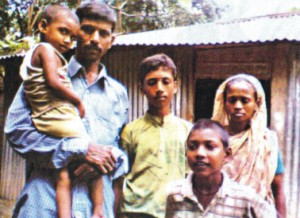|
Human Rights
Protest; Never Give In
Ekram Kabir
 |
Tithi |
In a never-ending atmosphere of bad news on the state of women in Bangladesh, Tanwee, a Class VI student of Mirpur Pilot High School in Kushtia, has done something that fills us with hope. Her protest against a boy named Rajon's harassment has made the tormentor to seek an apology after signing a memorandum, saying that he would never again harass any girl. Rajon assaulted Tanwee, because she didn't cooperate with him in his bid to propose love for another girl in the same school. He beat up Tanwee.
Our heartfelt respect for Tanwee for not bowing down to the malevolent intentions of that boy, who would have never changed his behaviour if she hadn't protested.
However, the scenario isn't that bright as far as protesting against this kind of intimidation is concerned, which we, with a forgiving attitude, call “eve teasing”. The death of Tithi, a school girl in Savar, has again brought the issue of harassing women to the fore. Tithi committed suicide because she couldn't bear the humiliation of being harassed by a few boys in the locality she lived. Our inevitably dishonest police didn't even help her when she along with her mother, sought help from them. The protectors of law broke it by asking for bribes from them and let Tithi die.
Tithi isn't alone. There's a long list of girls who all took their own lives because the wicked pestering of the boys was too much for them to bear.
In an atrocious feat of paranoia for power, leaders of national constituencies seem to be neglecting many basic expectations of the people. Stopping unnatural deaths in our society has been one such expectation for a long time. People are dying of incidents in which they haven't played any role. Road accidents, ferry capsizes, death from arsenic contamination etc., are a few among many examples. These are not any act of divinity, as our national leaders would try to say in their usual stance of giving excuses for their failures. These happen due to the sheer negligence of the national leaders to the people's causes.
We have always called these types of boys “eve teasers”, but we, apart from the victims and their families, never thought seriously about the damage they do on the entire society. Recently, a lawmaker was asked on a TV show to comment on Tithi's death. He sounded quite empathetic to girls like Tithi, asking to create social awareness against “eve-teasing”. Unfortunately, he didn't explain how and who is going to take the responsibility of building the social awareness. Who will convince the boys that intimidating women is a crime?
Bangladesh is a country that has a track record - in the recent past - of a father being killed when he protested against his daughter being intimidated. The social voice against these crimes was much stronger in the past. People used to protest when they saw these crimes take place on the streets. Over time, courage of the people to protest against these crimes has weakened. It's because previously the assailants didn't have lethal weapons in possession, but almost all of them, according to available reports, carry firearms these days. And this is why people around the scene of the crime are scared to oppose. In spite of this fact, it is urgent that people should become more conscious about these crimes.
On the other hand, when these criminals are identified or captured, there should be a social commitment to ostracise them from the community. If the local shalishe [traditional court] can ostracise a girl for having a love affair with someone, why wouldn't the shalish be able to do the same to a boy or a man who pulls off the scarf from a girl's body?
Parents at every home can a do a lot by teaching their sons not to intimidate girls. What is taught at home remain forever in a person's mind. But unfortunately, how many parents in our society alert their sons on this issue? At least I never told my son that this is a crime. All parents consider their sons to be angels and therefore never imbue them with the value of not intimidating any girl. But it's time we did that.
Educational institutions are supposed to teach the students to become good humans. At least that was what we learnt from the school we studied during the early days of independent Bangladesh. Has this changed? Have the schools and colleges, over time, stopped teaching the humans values that put deep impacts on the society? We thought over time people have become much more humane, developed and of course, enlightened.
 We had a set of “dos and don'ts” in our school. Those dos and don'ts kept us away from many wrongdoings. Schools could be the places from where true awareness against harassing women could begin. A strict “harassment code” at institutions against pestering fellow school or college mates could go a long way in making the boys, who are become “guys”, in future. A “harassment code” would keep the boys away from eve-teasing or assaulting any girl at least on the school premises. Then, once out of school, the would-be guys would think twice before harassing any girl. We had a set of “dos and don'ts” in our school. Those dos and don'ts kept us away from many wrongdoings. Schools could be the places from where true awareness against harassing women could begin. A strict “harassment code” at institutions against pestering fellow school or college mates could go a long way in making the boys, who are become “guys”, in future. A “harassment code” would keep the boys away from eve-teasing or assaulting any girl at least on the school premises. Then, once out of school, the would-be guys would think twice before harassing any girl.
In spite of all social and legal measures against these criminals, the best possible resistance would come from the victims themselves who, day in and day out, suffer at the hands of these so-called “boys”. Think about it. How many voices would these so-called “boys” be able to shut up? If Tanwee had not protested, Rajon would have gone scot-free and attacked someone else on the next day. There may be many like Tanwee, but there voices mostly remain unheard.
Our urgent request goes out to all girls and women of Bangladesh to be strong enough to protest against these crimes by exposing these felons. It would be a silly idea to kill oneself. Your death would make us guilty of not doing anything for this. More so, you'd leave your dear ones in an agony from which they would never be able to come out. Therefore, suicide isn't worth it, but protest would be. Make your voices heard and see what difference it can make.
Ekram Kabir is a Dhaka-based journalist.
Photo credit: Prothom Alo
Copyright (R) thedailystar.net 2006 |
